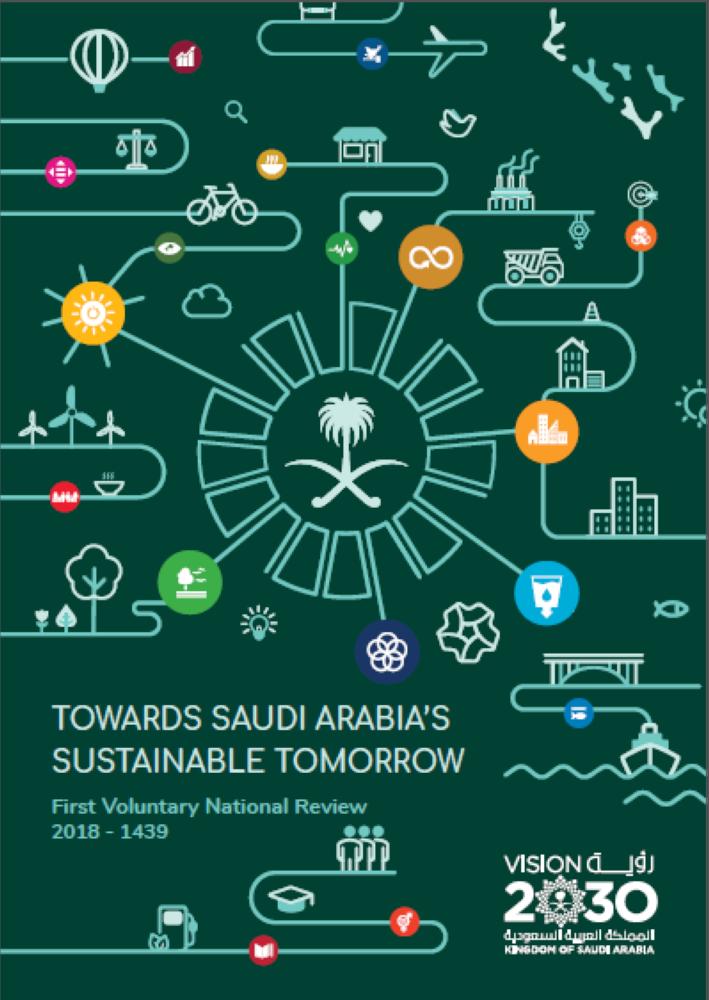
This National Review has been prepared to shed light on the efforts being made by the Kingdom of Saudi Arabia towards the implementation of the Sustainable Development Goals (SDGs). It will be presented at the 2018 United Nations High-Level Political Forum (HLPF) on Sustainable Development. The review represents the Kingdom’s first attempt to conduct a systematic and comprehensive review of the status of the SDGs and actions taken by relevant stakeholders to fulfill the 2030 Agenda for Sustainable Development.
The review was developed to accomplish the following objectives:
- Provide a broad assessment of the current status of the SDGs, existing institutional arrangements for their operationalization and the enabling policy environment
- Establish a baseline for tracking progress on the goals implementation
- Identify priorities for further action in the implementation process
- Identify opportunities, challenges and lessons learned
- Outline the next steps in the process
Vision 2030 of the Kingdom of Saudi Arabia was launched and approved by the Council of Ministers in April 2016. The underpinning quest of Vision 2030 is to address current regional and international challenges, maintain development gains, diversify and stimulate economic growth and end its reliance on oil as the mainstay source of income. Vision 2030 is an ambitious methodology and a roadmap for the Kingdom to gain a prominent international standing in all economic, social and cultural spheres. It also outlines the Kingdom's course for continued and accelerated sustainable development efforts leading up to a higher standard of living and improved quality of life for citizens. Towards this end, Vision 2030 envisages three pillars, namely a vibrant society, a thriving economy and an ambitious nation.
Custodian of the Two Holy Mosques King Salman shared that: “ We are part of this world and we live the problems and challenges it is facing. We all share this responsibility and we will contribute, God willing, actively to the development of solutions to many of the world’s pressing issues, including the issues of the environment and sustainable development. We will continue in this regard to work with international organizations, institutions and partners.”
Crown Prince Mohammed Bin Salman shared that: “In order to preserve the unique environmental character of the region, environmental sustainability laws and mechanisms will be developed. Natural resources will be conserved in accordance with the best practices and standards in place globally.”
In the economic sphere, the process of transformation has been remarkable. Saudi Arabia has experienced decades of rapid economic growth that has enabled it to become a high-income country and a member of the G-20. While the foundations for this success have been provided by the Kingdom’s abundant natural resources, the government is now committed to diversify the economic base and the capabilities of the labour force. The government has invested significant resources in advanced transport, communications, e-government, water supply, sanitation and energy. Furthermore, the country has established an advanced infrastructure for research, development and innovation and built partnerships between the public and private sectors, CSOs, research centers, universities and other entities. As highlighted in the report, marked improvements have taken place in the business and investment environment to encourage domestic and foreign investments and foster industrial development. According to the World Bank Group’s latest Doing Business report, Saudi Arabia has carried out the largest number of reforms to improve the business climate for small and medium enterprises in the Middle East and North Africa region.
In the environmental sphere, Saudi Arabia has experienced significant investments in efficient waste management, the establishment of comprehensive recycling projects and efforts to reduce desertification and various forms of pollution. To address the challenge of limited water resources and to supply high-quality drinking water to consumers, optimal use of water resources is promoted through reduced consumption and the utilization of desalinated and treated water. The Kingdom is also actively promoting the use of clean energy and the construction of green buildings. Significant investments have taken place in the area of renewable energy, especially solar power. Serious efforts have also been made in the protection and sustainable use of marine and coastal ecosystem. The Kingdom has long been concerned with ecosystems and is an initiator and advocate for the conservation of the ecosystem as a basis for sustainable development. In this regard, the Kingdom’s land protected areas have increased considerably.
SDG-related activities will proceed hand-in-hand with the realization of Vision 2030 which is already well underway. Saudi Arabia will continue to incorporate the SDGs into public policies and plans through close collaboration between all relevant stakeholders.
